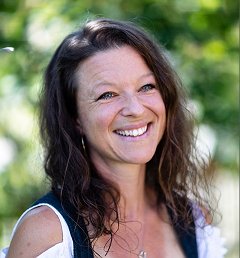Free for All: Open RE Course - Lectures on YouTube, Slides on Slideshare & Material on Foss2Serve
In the endeavour of making RE Education more accessible and available, I shared my semester-long Master-level course materials online. The videos are available on YouTube and have received 25k views from around the world, and the slides, assignments, and suggested readings are provided on Foss2Serve, a portal developed under NSF funding. The objective of this short paper is to explain what the available resources are, how this resource has come together and how it has been used. All materials are under Creative Commons Attribution-ShareAlike 4.0 International License and have been used at universities in at least 5 countries plus by individuals globally.
Birgit Penzenstadler is faculty at Chalmers University of Technology, Sweden, and Lappeenranta Lahti University of Technology, Finland (before: California State University Long Beach). Her research focus is how neuroplasticity practices can support engineers and other computer workers in improving their presence, creativity, cognitive abilities, immune systems, sleep and overall resilience (for details, see https://www.twinkleflip.com). She has been researching the relation between sustainability and software engineering for a decade and focuses on artifact-based requirements engineering and requirements engineering for sustainability. Her expertise includes requirements elicitation, analysis, design and documentation techniques, for example sustainability goal modeling, as well as artifact models, quality modeling, tool support, and process improvement (see https://www.sustainabilitydesign.org and http://birgit.penzenstadler.de). Penzenstadler received a habilitation from the Technical University of Munich’s Faculty of Informatics. She’s a member of IEEE and ACM. Contact her at birgitp @ chalmers.se
Thu 15 AprDisplayed time zone: Amsterdam, Berlin, Bern, Rome, Stockholm, Vienna change
13:30 - 15:00 | |||
13:30 10mTalk | Requirements Engineering Course Material for First-Year Software Engineering Students OpenRE Jennifer Horkoff Chalmers and the University of Gothenburg | ||
13:40 10mTalk | Free for All: Open RE Course - Lectures on YouTube, Slides on Slideshare & Material on Foss2Serve OpenRE Birgit Penzenstadler Chalmers | ||
13:50 10mTalk | Requirements Engineering in Industry: Modular Foundational Online Training to Build Basic Practices OpenRE Sarah Gregory Intel | ||
14:00 60mOther | Panel: REcovering from a pandemic: are we still the same after one year of remote RE? OpenRE Jennifer Horkoff Chalmers and the University of Gothenburg, Birgit Penzenstadler Chalmers, Sarah Gregory Intel, Martin Glinz University of Zurich, Zachary Oster University of Wisconsin-Whitewater | ||
